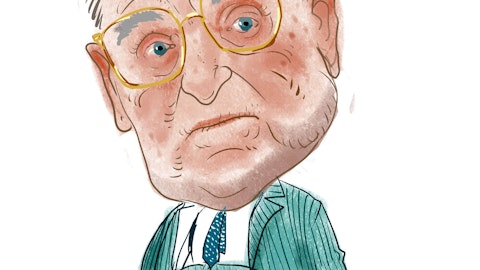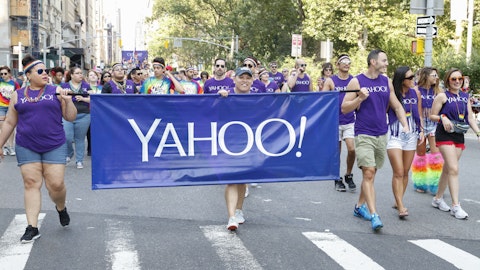The latest round of 13F filings has brought to light some interesting changes in the portfolio of hedge fund legend Stanley Druckenmiller. His fund, Duquesne Capital, now has enhanced exposure to basic materials stocks, with financial and tech stocks coming right behind. A former portfolio manager for George Soros’ Quantum Fund (now Soros Fund Management), Druckenmiller is famous for “breaking the Bank of England” in 1992, when he had massively shorted the British Pound. He founded Duquesne Capital back in 1981 and, following his departure from Quantum in 2000, has focused solely on managing his fund. In 2010, Druckenmiller closed Duquesne Capital to new investors, claiming he’d be unable to provide high returns. He continues to file 13F reports, though, and his latest moves in several basic materials stocks will be discussed below.

First a quick word on why we track hedge fund activity. In 2014, equity hedge funds returned just 1.4%. In 2013, that figure was 11.3%, and in 2012, they returned just 4.8%. These are embarrassingly low figures compared to the S&P 500 ETF (SPY)’s 13.5% gain in 2014, 32.3% gain in 2013, and 16% gain in 2012. Does this mean that hedge fund managers are dumber than a bucket of rocks when it comes to picking stocks? The answer is definitely no. Our small-cap hedge fund strategy, which identifies the best small-cap stock picks of the best hedge fund managers returned 28.2% in 2014, 53.2% in 2013, and 33.3% in 2012, outperforming the market each year (it’s outperforming it so far in 2015 too). What’s the reason for this discrepancy you may ask? The reason is simple: size. Hedge funds have gotten so large, they have to allocate the majority of their money into large-cap liquid stocks that are more efficiently priced. They are like mutual funds now. Consider Ray Dalio’s Bridgewater Associates, the largest in the industry with about $165 billion in AUM. It can’t allocate too much money into a small-cap stock as merely obtaining 2% exposure would really move the price. In fact, Dalio can’t even obtain 2% exposure to many small-cap stocks, even if he essentially owned the entire company, as they’re simply too small (or rather, his fund is too big). This is where we come in. Our research has shown that it is actually hedge funds’ small-cap picks that are their best performing ones and we have consistently identified the best picks of the best managers, returning 118% since the launch of our small-cap strategy compared to less than 58% for the S&P 500 (see the details).
Follow Stanley Druckenmiller's Duquesne Capital
Freeport-McMoRan Inc (NYSE:FCX) is one of Druckenmiller’s top new additions to his fund’s equity portfolio. According to Duquesne’s latest 13F filing, throughout the second quarter Druckenmiller built a position that comprises 3.54 million shares, which are valued at a little over $66 million as of June 30. The stock took a hammering in the first half of this year, having lost more than 60% of its value, and is currently trading at $8.78 per share. For the three months ending June 30, Freeport-McMoRan Inc (NYSE:FCX) reported revenues of $4.25 billion and a loss of $0.09 per share. Market analysts expect better results for the current quarter, eyeing revenues of $4.26 billion and earnings per share of $0.10. Ken Griffin and Mario Gabelli are also bullish on this stock, having increased their holdings during the quarter. Griffin’s stake in Freeport-McMoRan Inc (NYSE:FCX) rose by 19% to 2.72 million shares valued at $50.8 million, while Gabelli boosted his stake to 2.73 million shares worth $50.9 million, according to their respective quarterly filings.
Dow Chemical Co (NYSE:DOW) is another new addition to Duquesne’s porftolio, with Druckenmiller having bought 1.16 million shares worth $59.5 million. Among the hedge funds we track, Third Point, run by Dan Loeb, holds the biggest position in this company of 23.0 million shares, up by 5% during the second quarter. Stanley Druckenmiller’s former boss, George Soros, also holds a significant position, which was boosted by 5% to 4.86 million shares valued at $248 million. Down by 10% so far this year, Dow Chemical Co (NYSE:DOW) had reached a high of $53.77 in June before tumbling to a current price of $41.07. Dow Chemical Co (NYSE:DOW) has a market cap of $46.3 billion and pays an annual dividend of $1.63, carrying a yield of 4.00%. The stock is trading at a trailing Price to Earnings (P/E) ratio of 11.66, significantly lower than the industry average of 19.60.
Druckenmiller also sees some great upside potential in Alcoa Inc (NYSE:AA) and has built a position that amasses 3.65 million shares worth approximately $40.7 million. The latest financial results from the company have been disappointing, with it having registered revenues of $5.89 billion, nearly half the figure reported for the same period of last year. Earnings per share have also been squeezed and amount to $0.21, down by 21% year-over-year. This poor performance is reflected in the stock’s movement, down by 47% so far in 2015. The weakness in aluminum prices has had a significant impact on Alcoa Inc (NYSE:AA)’s bottom line, but has also prompted its management to engage in a transformation of the company, diversifying its business segments and focus onto its aerospace and auto businesses. This move has prompted a large number of hedge funds to go long on Alcoa Inc (NYSE:AA), with Ken Griffin and George Soros among the top investors who are betting big on the stock. Griffin’s Citadel Investment Group holds 5.71 million shares, up by 133% during the second quarter of 2015, while Soros Fund Management has built a position that comprises 5.34 million shares, worth approximately $59.5 million.
Disclosure: None





